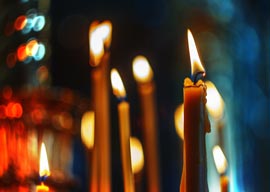
December 12, 2015

Source: Shutterstock
Have we ever needed Christianity more than today? It’s a rhetorical question, for sure, because the loss of our faith and the inability to confront Islam have never been greater. When I was a little boy during the war, my mother assured me that if I believed in Jesus everything would be okay. This was during the bombing by the Allies on Tatoi, the military airfield where the Germans concentrated their antiaircraft guns near our country house. My fräulein, the Prussian lady who brought me up, was more practical. She handed me a beautiful carved knife that made me feel safer than my prayers ever did.
Today, of course, 74 years later, my prayers are far more likely to help my peace of mind than a knife in my pocket. That’s the difference between being five and seventy-nine years of age. Mind you, now I pray only for the safety and welfare of my children and their mother. My soul I sold to the devil long ago. No prayers will save that loser. At times, during Christmas and Easter, when I go to church, light a candle, and sit alone in a pew, all these memories come flooding back, especially my fear of the noisy Anglo-American bombs that rained down around us, and how only the steel in my pocket gave me courage.
Atheists seem to be le gout du jour nowadays. Our celebrity culture has no room for faithful people, especially Christians—only Islam enjoys that privilege. In 1966 Time magazine shocked its readers with a cover that asked whether God was dead. I remember it well because Henry Luce died soon after. Was there a hidden message somewhere, I wondered? But Luce was a devout Christian and a great believer in the Almighty, unlike Christopher Hitchens, whose favorite targets were priests, Mother Teresa, and God, a Christian God whose followers turned the other cheek. The Hitch had very little to say against Allah because he knew the latter’s followers did not take kindly to cheap remarks against him. Hitchens deplored Christmas, “the collectivization of gaiety and compulsory bad taste,” as well he should have, being an opportunist. Atheism gets you in through the front door, Christianity is reserved for the trade entrance. He hated the “confessional drool” that families mailed to one another, especially simple people who believe in love and forgiveness.
The evolutionary biologist Richard Dawkins is an atheist hard to dislike. He’s charming and never a bully, learned and intelligent. Ditto for some ancients—here I rely on the ancient Athenian Taki and his epigrams—like Socrates and his ilk. Also Voltaire and Mill and so on. The first modern to go atheist and announce that God had had it was Nietzsche, who predictably went bonkers. Terrific shits like Freud and Picasso were atheists, as were French fries like Michel Foucault and Jacques Lacan, and our very own H.G. Wells. And James Joyce and Philip Roth. One thing I noticed all these talented writers and thinkers have in common except for their disbelief in the Almighty is great physical ugliness. That alone should explain it.
The great 20th-century theologian Paul Tillich wrote that to believe that God is active at all times—being out there somewhere, dwelling in a special place and being affected by events—is a shallow supposition: “The literalism of God deprives God of his ultimacy.” That’s where “There is no God,” the cry from the heart of those who have lost a loved one, comes from. Ditto the old saw that you need God in order to be good. God is what makes us understand the difference between good and evil, take it from Taki.